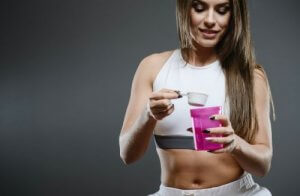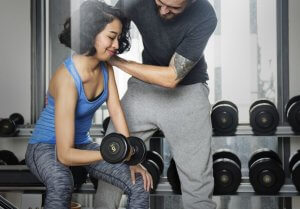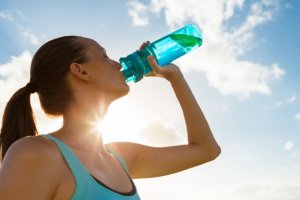Post-Workout Supplements: seven helpful tips

Muscle recovery following a demanding workout isn’t complicated. These seven tips for using post-workout supplements will improve your recovery, while also promoting muscle growth.
After exercise, the body produces more cortisol, the stress hormone that catabolizes (or breaks down) the muscle. You need to reverse this process, and this is achieved by re-establishing your energy levels. In this article on post-workout supplements, we’ll tell you everything you need to know.
Seven tips for using post-workout supplements
If you apply a formula that includes rehydration and consuming proteins and carbs, your success will be guaranteed. Post-workout supplements are perfect for attaining this goal.
How long does muscle recovery take?
Some specialists say that there is a six-hour period for maximizing muscle recovery following a high-impact workout. This is what’s known as an “anabolic window,” which really just describes the recovery period.

This is the ideal time for repairing muscular damage. Your blood circulation, along with your testosterone and growth hormone production will guarantee better results. The delivery of nutrients and protein synthesis are at their highest during this period.
Protein supplements: when and why?
It’s a good idea to wait for 60 minutes after finishing your workout before having a hydrolyzed protein or whey protein shake. Hydrolyzed protein increases the body’s ability to recover and gain strength.
If you consume carbohydrates with a high glycemic index, then you can continue with physical activities that same day. Carbohydrates replenish the glycogen stores that are lost during the workout. This chemical substance fuels the body during exercise. Moreover, it is exhausted more quickly as the intensity increases.
Carbohydrates can be obtained through cyclodextrin supplements, which optimize the replenishment of glycogen. Eating bread, oats, pasta, grains, carrots, and potatoes also help to restore glycogen. The same goes for chocolate, and fruits such as mangos, apples, plums, melons, bananas, pineapples, and figs.
Creatine and phosphatidic acid
This next tip concerns consuming creatine monohydrate via shakes. This is an energy source that, once activated, provides support for cells coping with intense exertion. It increases cellular hydration, physical performance, and the development of muscle mass.

Your post-workout shake should also include a dose of phosphatidic acid. This will help protect the cellular membranes and facilitate your physical recovery.
Zinc: preventing potassium and sodium loss
Your supplement shake should also contain zinc in order to replenish the loss of electrolytes such as potassium and sodium through sweat.
Potassium is a mineral that helps muscle contraction and relaxation. It also promotes the growth of muscle tissue. A lack of potassium can cause cramps and muscle fatigue after exercise. In order to compensate, eating a banana after your workout goes a long way.
Sodium regulates water levels in cells. It also helps in the transmission of nerve impulses and maintains both blood pressure and proper muscle function.
A lack of sodium causes hyponatremia. The symptoms include headaches, dizziness, nausea, confusion, vomiting, and difficulty concentrating. Spinach, beetroot, and ham are foods that are all rich in salt.
Another shake and a full meal
After an hour has passed, you can have another hydrolyzed protein shake. It’s also a good idea to eat a solid meal, rich in proteins, that contains beef, chicken or fish. This will help provide the nutrients you need.
Hydration is essential
During an intense workout session, the body may lose over a liter of water. For this reason, it’s very important to drink enough water during and after exercise.

Water will restore your electrolyte balance while preventing cramps, nausea, fatigue and even mental confusion. In addition, it also prevents the deterioration of muscle proteins and maintains the elasticity of your joints and tissues.
Cooling down and stretching are indispensable
The cooling down and stretching phases are both essential parts of a post-workout routine. You need to maintain movement, but in a relaxed manner. This will help return your heart rate to normal levels while preventing dizziness and fainting.
Muscle recovery following a demanding workout isn’t complicated. These seven tips for using post-workout supplements will improve your recovery, while also promoting muscle growth.
After exercise, the body produces more cortisol, the stress hormone that catabolizes (or breaks down) the muscle. You need to reverse this process, and this is achieved by re-establishing your energy levels. In this article on post-workout supplements, we’ll tell you everything you need to know.
Seven tips for using post-workout supplements
If you apply a formula that includes rehydration and consuming proteins and carbs, your success will be guaranteed. Post-workout supplements are perfect for attaining this goal.
How long does muscle recovery take?
Some specialists say that there is a six-hour period for maximizing muscle recovery following a high-impact workout. This is what’s known as an “anabolic window,” which really just describes the recovery period.

This is the ideal time for repairing muscular damage. Your blood circulation, along with your testosterone and growth hormone production will guarantee better results. The delivery of nutrients and protein synthesis are at their highest during this period.
Protein supplements: when and why?
It’s a good idea to wait for 60 minutes after finishing your workout before having a hydrolyzed protein or whey protein shake. Hydrolyzed protein increases the body’s ability to recover and gain strength.
If you consume carbohydrates with a high glycemic index, then you can continue with physical activities that same day. Carbohydrates replenish the glycogen stores that are lost during the workout. This chemical substance fuels the body during exercise. Moreover, it is exhausted more quickly as the intensity increases.
Carbohydrates can be obtained through cyclodextrin supplements, which optimize the replenishment of glycogen. Eating bread, oats, pasta, grains, carrots, and potatoes also help to restore glycogen. The same goes for chocolate, and fruits such as mangos, apples, plums, melons, bananas, pineapples, and figs.
Creatine and phosphatidic acid
This next tip concerns consuming creatine monohydrate via shakes. This is an energy source that, once activated, provides support for cells coping with intense exertion. It increases cellular hydration, physical performance, and the development of muscle mass.

Your post-workout shake should also include a dose of phosphatidic acid. This will help protect the cellular membranes and facilitate your physical recovery.
Zinc: preventing potassium and sodium loss
Your supplement shake should also contain zinc in order to replenish the loss of electrolytes such as potassium and sodium through sweat.
Potassium is a mineral that helps muscle contraction and relaxation. It also promotes the growth of muscle tissue. A lack of potassium can cause cramps and muscle fatigue after exercise. In order to compensate, eating a banana after your workout goes a long way.
Sodium regulates water levels in cells. It also helps in the transmission of nerve impulses and maintains both blood pressure and proper muscle function.
A lack of sodium causes hyponatremia. The symptoms include headaches, dizziness, nausea, confusion, vomiting, and difficulty concentrating. Spinach, beetroot, and ham are foods that are all rich in salt.
Another shake and a full meal
After an hour has passed, you can have another hydrolyzed protein shake. It’s also a good idea to eat a solid meal, rich in proteins, that contains beef, chicken or fish. This will help provide the nutrients you need.
Hydration is essential
During an intense workout session, the body may lose over a liter of water. For this reason, it’s very important to drink enough water during and after exercise.

Water will restore your electrolyte balance while preventing cramps, nausea, fatigue and even mental confusion. In addition, it also prevents the deterioration of muscle proteins and maintains the elasticity of your joints and tissues.
Cooling down and stretching are indispensable
The cooling down and stretching phases are both essential parts of a post-workout routine. You need to maintain movement, but in a relaxed manner. This will help return your heart rate to normal levels while preventing dizziness and fainting.
This text is provided for informational purposes only and does not replace consultation with a professional. If in doubt, consult your specialist.








